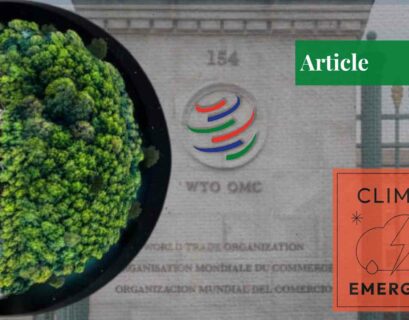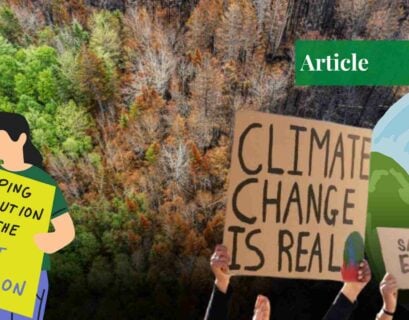Aimen Ayaz is an International Relations graduate from Quaid-e-Azam University Islamabad. She is an avid reader and a believer in the advocacy of human rights. She also practices environmentalism and hopes to contribute to the creation of a safer world for children, women, the planet, and perspectives too.
The Climate is at Stake
‘How to Avoid a Climate Disaster: The Solutions We Have and the Breakthroughs We Need’ is a February 16th, 2021 publication by the well-renowned innovator, author, and philanthropist Bill Gates. The author himself does not need any introduction. Bill Gates is known for his affiliation with Microsoft; however, his work spectrum has gone beyond his computer company.
Currently, he is more recognized for his work towards eradicating poverty and diseases like malaria. The Bill and Melinda Gates Foundation is the child of this philanthropic spirit. With ‘How to Avoid a Climate Disaster’, Gates extends his desire to work for better lives through the environmental sector. The book comprises a total of twelve chapters each a build-up to the concept of the following chapter.
As the complete title suggests, Gates’s book is a holistic insight on the subject matter, with a range of explanatory chapters based on explaining climate change; from the main contributors to its aggravation to suggesting a policy approach that he believes will work towards finding permanent solutions to its end. The division of the work syncs with the argument that Bill Gates has built.
Solution to Climate Change?
Bill Gates’ main thesis of the book is his belief in there being a solution to climate change in technology and innovation. To back this up, Gates shares his learning from years of research on the topic. It is both explanatory and prescriptive. Gates begins his work by first defining climate crisis and his main goal; ‘ways to get to Zero’.
By zero, he means zero carbon and carbon-related emissions to slow down the process of deterioration of the planet. To this end, he highlights the sectors that contribute the greatest to this, namely the manufacturing industry, agriculture, energy sector, and our transport. The themes are dealt with separately and provide an in-depth analysis of each issue.
In addition, Gates also suggests the ways the switch will need to be made. He introduces his readers to the term, ‘Green Premium’, which is the amount of capital that would go into switching to the sustainable side of each sector. The concept of Green Premium is another one of the major themes of Bill Gates’ study.
Moreover, besides highlighting the issues, the book has been used to also elaborate on the lack of action or complete inaction towards coming up with a plan on any level, be it individual, state, or system. He adds that climate diplomacy will be the hardest to attain because of the lack of consensus on it.
Climate Policy
Another theme that is recurrent in How to Avoid a Climate Disaster is his policy suggestions which include a need to tackle this situation from all fronts. For instance, he writes, “We can work on a local, national, and global level to build the technologies, businesses, and industries to avoid the worst impacts of climate change.”
Gates is an innovator; he firmly believes that innovation is capable of cutting down the damages it created in the first place. Here, he teams innovation with policy for better results. Bill Gates’s contributions to modern development starting from our PCs to this very app I am using to type this review are rightfully recognized.
Gates is a developer and an innovator; he does not attempt to hide this side of him in the book at all, rather it shines through. Gates’s penmanship should also be lauded; his idea is to deliver the message across to everyone and that is exactly what he does. The message is delivered in the simplest language, so that a simple, non-scientific person may be able to learn and understand the same things about climate change as do the technicians in the field.
Every author brings in a perspective, but when one reviews a book, they often do not review the language. When I read this book, as an International Relations specialist, I felt that Bill Gates made a point, a good one; we often want to bring change, however, we forget to get everyone on board for that. Climate change is one such change, it is true and extremely significant that a child, a woman, and a man, all understand the issue with the same urgency.
All about Perspective
While I felt that the main content did not have any gaps, mainly because the author in the very beginning declared that he wrote not from an expert’s angle but that of a learner — and learners make mistakes. Thereafter, it is not a criterion anymore. Expect mistakes. Mr Gates did, however, stay true to only the innovation and development sides. He mentioned the many innovations around the world and his policy suggestions often overlook certain ground realities.
Perhaps his philanthropist side got in the way, for which capital mobilization, for the many policies he suggested, came about with much ease. He wrote from a neo-liberal angle, maybe a constructivist, even a little utilitarian. While reading, a lot of questions came to my mind; why is Gates assuming that the rich will start taking climate change seriously because of a pandemic and a Greta Thunberg?
Is he thinking that everyone can build a business from scratch, just like that? I realized that my thoughts and approach were more embedded in post-structuralism. I tend to look at things from a local angle. To anyone else, Gates’s ideas made perfect sense; to me, they lacked the consideration of disparities because I acknowledge the reality of the rich never wanting to help the poor.
Bill dreamed of it, I did not. Yet, I appreciate what he wrote. ‘How to Avoid a Climate Disaster: the Solutions We Have and the Breakthroughs We Need’ is a must-read. Bill Gates is a perceptive man; he reinstates this with this book. Besides, if the pandemic has taught us all one thing, it is that nature is going to be our biggest challenge, staying in denial that it won’t is of little help. Better best be aware!
If you want to submit your articles, research papers, and book reviews, please check the Submissions page.
The views and opinions expressed in this article/paper are the author’s own and do not necessarily reflect the editorial position of Paradigm Shift.



















